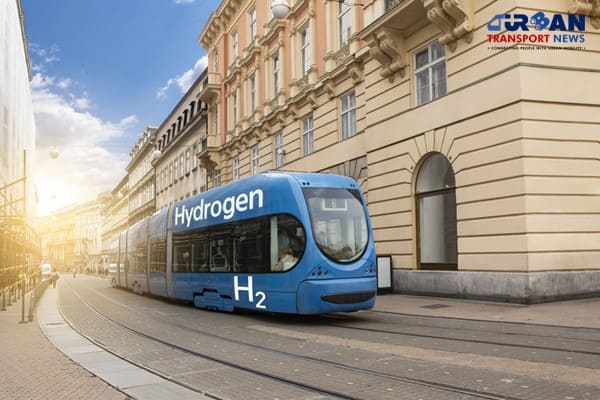 North-South Commuter Railway (NSCR): Modern Train Network Connecting Luzon Island
North-South Commuter Railway (NSCR): Modern Train Network Connecting Luzon Island India launched Bharat Taxi Service as First Cooperative-Owned Digital Mobility Platform
India launched Bharat Taxi Service as First Cooperative-Owned Digital Mobility Platform India places World’s First Live Commercial Order for Hyperloop-Based Cargo Logistics
India places World’s First Live Commercial Order for Hyperloop-Based Cargo Logistics How Weigh-in-Motion Systems Are Revolutionizing Freight Safety
How Weigh-in-Motion Systems Are Revolutionizing Freight Safety Women Powering India’s Electric Mobility Revolution
Women Powering India’s Electric Mobility Revolution Rail Chamber Launched to Strengthen India’s Global Railway Leadership
Rail Chamber Launched to Strengthen India’s Global Railway Leadership Wage and Hour Enforcement Under the Massachusetts Wage Act and Connecticut Labor Standards
Wage and Hour Enforcement Under the Massachusetts Wage Act and Connecticut Labor Standards MRT‑7: Manila’s Northern Metro Lifeline on the Horizon
MRT‑7: Manila’s Northern Metro Lifeline on the Horizon Delhi unveils ambitious Urban Mobility Vision: Luxury Metro Coaches, New Tunnels and Pod Taxi
Delhi unveils ambitious Urban Mobility Vision: Luxury Metro Coaches, New Tunnels and Pod Taxi Qatar approves Saudi Rail Link Agreement, Accelerating Gulf Railway Vision 2030
Qatar approves Saudi Rail Link Agreement, Accelerating Gulf Railway Vision 2030
The Role of Hydrogen Fuel Cells in Clean Transportation Worldwide

The transportation sector is a major contributor to global greenhouse gas emissions, and as nations strive to meet their climate targets, there is an urgent need for sustainable alternatives to fossil fuels. Among the promising technologies for decarbonizing transportation, hydrogen fuel cells have garnered significant attention. Hydrogen fuel cell vehicles (FCVs) offer a zero-emission solution, with high energy density, fast refueling times, and versatility across various transportation sectors. As global momentum for clean energy builds, hydrogen fuel cells are positioned to play a pivotal role in shaping the future of transportation.
The Promise of Hydrogen Fuel Cells
Hydrogen fuel cells generate electricity by converting hydrogen gas into power, with water vapor and heat as the only byproducts. This electrochemical process offers several key benefits, making it an attractive alternative to traditional fossil fuel-based transportation.
-
Zero Tailpipe Emissions: Unlike internal combustion engines, which emit harmful pollutants and greenhouse gases, hydrogen fuel cells only produce water vapor and heat, making them a truly zero-emission technology.
-
High Energy Density: Hydrogen has a high energy density by weight compared to conventional fuels, allowing for longer driving ranges than battery-electric vehicles (BEVs) in certain applications. This is particularly important for heavy-duty and long-distance transportation.
-
Rapid Refueling: Hydrogen-powered vehicles can be refueled in just a few minutes, offering a significant advantage over BEVs, which can take hours to recharge. This makes hydrogen an appealing option for industries requiring high operational uptime and quick turnaround times.
-
Scalability: Hydrogen can be produced from various sources, including renewable energy through electrolysis, allowing for the creation of sustainable, green hydrogen. This flexibility is crucial for scaling up hydrogen infrastructure globally.
Applications Across Transportation Sectors
Hydrogen fuel cell technology has the potential to revolutionize multiple sectors of transportation. While BEVs currently dominate passenger cars, hydrogen offers complementary solutions, especially for long-distance travel, heavy-duty transport, and regions with limited charging infrastructure.
1. Heavy-Duty Transportation
Hydrogen fuel cells are particularly well-suited for heavy-duty applications, where long-range, high power output, and quick refueling are essential. Long-haul trucks, buses, and trains are some of the most promising candidates for hydrogen adoption.
-
Cellcentric (Volvo Group and Daimler Truck AG): This joint venture is focused on developing and commercializing hydrogen fuel cell systems for heavy-duty trucks. By addressing the power and durability requirements of long-haul trucking, Cellcentric is driving the decarbonization of the logistics industry, where reducing emissions is a critical challenge.
-
Hydrogen-Powered Trains: Alstom's Coradia iLint is a pioneering hydrogen-powered passenger train that operates in Germany and other European countries. This fuel cell train demonstrates the feasibility of zero-emission rail travel and showcases hydrogen’s potential in hard-to-electrify sectors like rail transportation. The success of such trains marks an important milestone in decarbonizing rail systems.
-
Hydrogen Retrofitting: Companies such as ULEMCo, Clean Logistics, and Quantron are demonstrating the potential of retrofitting existing diesel trucks with hydrogen fuel cell powertrains. This approach offers a cost-effective way to transition to clean transportation without the need to replace entire fleets. Retrofitting existing vehicles significantly reduces the financial barriers to hydrogen adoption, providing a faster pathway to decarbonization.
2. Passenger Vehicles
While BEVs currently dominate the passenger car market, hydrogen fuel cell electric vehicles (FCEVs) are proving to be a viable alternative in certain regions and applications. FCEVs offer long driving ranges and quick refueling times, addressing the limitations of battery-electric vehicles.
-
Toyota Mirai and Hyundai Nexo: These commercially available FCEVs showcase the maturity of hydrogen fuel cell technology for passenger vehicles. With long-range capabilities and fast refueling times, these vehicles help demonstrate the practicality of hydrogen-powered mobility. These models are already in use in real-world conditions, providing valuable insights into how hydrogen can be integrated into everyday transportation.
-
Infrastructure Development: Countries like Japan, South Korea, and Germany are investing heavily in hydrogen refueling infrastructure. Japan, for instance, has become a global leader in the hydrogen space, with a rapidly expanding network of refueling stations. These investments are crucial to supporting the widespread adoption of FCEVs and other hydrogen-powered vehicles.
3. Other Applications
Beyond passenger vehicles and heavy-duty transport, hydrogen fuel cells are being explored in a variety of other sectors, demonstrating the versatility of this technology.
-
Maritime and Aviation: Companies are exploring the use of hydrogen fuel cells in ships and aircraft, two of the most challenging sectors to decarbonize. Hydrogen-powered vessels are already in development, and experimental aircraft are being tested as potential zero-emission alternatives to conventional aviation. While these applications are still in their infancy, they hold immense promise for reducing emissions in hard-to-decarbonize industries.
-
Warehouse Logistics: Hydrogen fuel cells are already being used in warehouses to power forklifts and other material handling equipment. This use case demonstrates the efficiency, reliability, and sustainability of hydrogen in industrial settings. Hydrogen-powered forklifts are seen as a viable alternative to battery-electric options, offering faster refueling times and higher operational uptime.
Key Practices and Examples of Growing Momentum
Several key practices and real-world examples highlight the accelerating momentum behind hydrogen fuel cell technology:
1. Green Hydrogen Production
The focus is increasingly on producing "green hydrogen" through electrolysis powered by renewable energy sources like wind and solar power. This method ensures that hydrogen is produced sustainably and not reliant on fossil fuels, making hydrogen fuel cells a truly green alternative for clean transportation.
2. Industry Collaborations
Industry partnerships are driving the innovation necessary to overcome the technical and logistical challenges of hydrogen fuel cell technology. Automakers, energy companies, and technology providers are collaborating to develop fuel cell systems, build hydrogen infrastructure, and reduce production costs. These collaborations are crucial to scaling hydrogen adoption.
Cellcentric (Volvo and Daimler) is one example of how joint ventures are pushing the development of hydrogen fuel cell technology. In parallel, automakers like Toyota, Hyundai, and BMW are advancing hydrogen-powered vehicles while working with energy providers to expand refueling infrastructure.
3. Government Support
Governments worldwide are playing a vital role in accelerating the adoption of hydrogen fuel cell technology through policy incentives, funding, and research initiatives. National and regional governments are investing in hydrogen infrastructure and providing subsidies for hydrogen-powered vehicles. In Europe, for instance, the European Commission has pledged billions in funding to support hydrogen research and infrastructure projects as part of its broader Green Deal.
Challenges and Opportunities
While hydrogen fuel cells offer considerable potential, several challenges need to be addressed before the technology can reach its full scale:
-
Infrastructure Development: Expanding hydrogen refueling stations is one of the most pressing challenges. A widespread refueling network is needed to ensure that FCEVs can be adopted on a global scale, particularly in regions where charging infrastructure is sparse.
-
Hydrogen Production Costs: Green hydrogen is currently more expensive than hydrogen derived from fossil fuels, making it less competitive. Research and development efforts are focused on lowering production costs, which will be essential for scaling hydrogen use in transportation.
-
Storage and Transportation: Hydrogen is a low-density gas that requires specialized storage and transportation solutions. Innovations in hydrogen storage and distribution technologies are critical to ensuring that hydrogen can be delivered safely and efficiently to end-users.
Despite these challenges, the opportunities for hydrogen fuel cells are immense:
-
Technological Advancements: Ongoing research is improving the efficiency, durability, and affordability of fuel cell technology, driving down costs and improving performance.
-
Growing Market for Clean Energy: The increasing demand for clean energy solutions is creating a favorable market for hydrogen fuel cells. As industries seek to decarbonize, hydrogen is emerging as a key solution.
The Future Outlook
The future of hydrogen fuel cells in clean transportation is bright, although achieving widespread adoption will require a concerted effort from governments, industries, and research institutions. As infrastructure develops, production costs fall, and technology advances, hydrogen fuel cells will become more competitive with other energy alternatives.
In the coming decades, hydrogen fuel cells will likely play a significant role in decarbonizing transportation, especially in sectors where battery-electric vehicles face limitations. Heavy-duty transport, rail, aviation, and maritime sectors will be some of the key areas where hydrogen is expected to make a substantial impact. While passenger vehicles may continue to be dominated by BEVs, hydrogen fuel cell vehicles will offer complementary solutions in specific use cases, such as long-distance travel and regions with limited charging infrastructure.
The transition to hydrogen-powered transportation systems will require investments in infrastructure, technological development, and supportive policies. By working together, governments, industries, and research communities can help unlock the full potential of hydrogen fuel cells, contributing to a cleaner, more sustainable future for global transportation.







